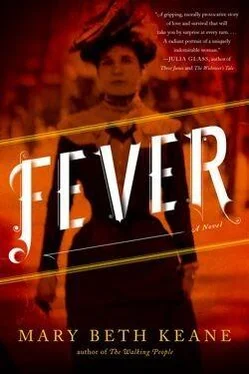Lying on her side and facing the wall, Mary pressed her palms harder against her ears but could still hear her roommates retching, sobbing, calling for people, relatives, probably, loved ones already dead. She’d seen it all before, but not like this, not so many in a single room, fifteen nightmares twisted together, plus hers, the sixteenth, the strand that didn’t look like any of the others. Finally, she gave up on sleep and went over to the window, which looked west along Sixteenth Street. The sidewalk was dark except for the yellow glow of a single streetlamp, and she searched the darkness for another sixth-floor window, and the shape of Alfred standing at it, not even twenty blocks away. If I shout, she thought, how far away will I be heard? She tried to imagine what he was doing at that hour. He never slept well when she was not at home.
The occupant of the bed nearest the window moaned, and Mary looked down to find a girl, no more than thirteen, her long dark hair wet with sweat and stuck in tendrils around her neck. Mary gathered it together and smoothed it away from the girl’s face. She turned her pillow to the cool underside. She told her it would all be over soon — and it would, for better or for worse — and fetched her a cup of water. She did the same for the rest of them and one woman clutched Mary’s wrist, called her Anna, and begged her not to leave. “We’ll be home soon, Anna,” the sick woman assured Mary, and Mary agreed that they would.
By dawn there were new guards stationed outside her door and she was back in her own bed observing the practiced approach of the nurses as they advanced on each patient with a bucket of cold water and a stack of clean washcloths pulled behind them on a wheeled cart. Mary forgot her predicament for a few moments as she saw how the abrupt coolness of a damp cloth at the head and neck made each woman still, for a moment, as if listening for something. A cloth under each arm calmed the features of their faces, brought them hope, and at the groin brought relief to their whole bodies, and in some patients, tears.
When the nurse who was tending to Mary’s row arrived at her bed, she held up a cloth and looked at her. “You’ve no fever,” she said.
“No.”
“I’m supposed to do the compress to everyone. They didn’t say yay or nay about you.”
“I’ll tell them you did it.”
“Fine.” The nurse continued to observe her. “When did you have it?”
“Never.”
“But you’re passing it along? People catching it from you?”
“Is that what they said to you?”
“Said it to all the doctors and nursing staff.”
“It’s a lie.”
The nurse tilted her head and looked at Mary’s body from her face down to the lump under the sheet that was her feet, back up to her face.
“Well, do you want the cloth anyway? And the water? To wash yourself? I gather you’ve had an ordeal.”
“Yes.” Mary sat up in the cot. “Yes, thank you.”
The nurses repeated the routine every hour, skipping Mary after that first time. At midmorning, Soper came and perched himself on the arm of a chair that was wedged between Mary’s cot and the wall. He told her it was time for her to cooperate, that they had a great deal of work ahead of them. As he spoke his eyes kept glancing over to the nurses as they moved about the room, lifting sheets, moving knees apart. He jumped up and asked to see Mary in the hall.
“How long do you mean to keep me here?” Mary asked, refusing to move until he gave her an answer.
“Come out to the hallway, Miss Mallon,” he said.
“No,” Mary said, lying back on her pillow and pulling the sheet to her chin.
“I don’t want to have to ask for this man’s assistance,” he said, gesturing toward one of the guards. “One way or another, I must talk to you about your gallbladder.”
“One way or another, I must get word to my friends to let them know what’s happened to me.”
“Later, Miss Mallon. Very soon.”
• • •
The first time Mary had encountered Dr. Soper was in the Bowens’ kitchen, almost one month earlier. She mistook him for a guest who’d arrived too early. It was a bitter-cold day, and there were fires going in every room except for the servants’ quarters, where the small stove would stay cold until bedtime. The Bowens had the type of home where it was easy to lose oneself: large in some senses, tall and broad, with great rooms — the distant ceilings covered with paintings of different scenes from foreign places — and windows looking out onto Park Avenue. But the natural light disappeared as one retreated farther into the house, and at the rear of the residence the staff had to work by lamplight all the time.
Mary had looked up from her work — a beautiful pair of ducks whose skin she was pricking with a knife so that the fat would drain out when she roasted them — and saw a tall man clutching his hat to his chest. He had a light step, and she didn’t hear him until he was nearly on top of her. He was handsome in that way some men in New York are handsome — neat as a pin, his clothes pressed, his hair and mustache precise. He was not a man who had ever shoveled coal or hauled ice or butchered an animal. He was not a man who owned a pair of work boots. He seemed older, though she later learned that they were the very same age, their birthdays one week apart.
• • •
Toward the end of her second day at Willard Parker, she answered a few of his questions and hoped that meant he would release her. But just after breakfast on her third morning he summoned her back to the room with the mahogany table and invited five other doctors to ask her questions as well. She recognized three of them from the day of her arrival. Dr. Baker was not present. Led by Dr. Soper, they kept asking if she was absolutely certain that she’d never had Typhoid Fever, if she could recall for them every person she’d known who’d suffered a fever since her arrival in the United States twenty-four years before. “Every person I’ve known who ever had a fever? Since 1883?” Mary almost laughed. Would they be able to do it, if they were asked the same thing?
“Or in Ireland,” one of the doctors said. “Any person who had a fever as far back as you can remember.” Their records on her went back to only 1901, and Mary decided they knew enough about her life in those five and a half years. She would not give them more. “I can’t remember,” she said. Dr. Soper walked over to her chair and asked her to demonstrate how she washed her hands after visiting the lavatory. Feeling so many eyes studying her, and knowing they would just keep asking if she refused, she made a peaceful scene in her mind and walked to the sink at the back of the room with her pulse thumping in her ears. They stood closely behind her to observe, so she went slowly, rubbing the bar of soap on the backs of her hands as well as her palms, between her fingers, taking the kind of time she never did when she had to worry about getting supper on the table at an appointed hour. She dried her hands on the hand towel hanging next to the sink, and they observed this as well.
“What are we missing?” Dr. Soper wondered aloud once they’d all returned to their seats. Missing from his notes were the details, Mary knew, the small things a woman notices, the expression on a person’s face when he turns away and thinks himself unobserved. When Dr. Soper appeared in the Bowens’ kitchen that night, she’d reached up to move a length of hair that had fallen out of her bun. She’d lifted her apron to wipe the duck fat from her hands. She’d closed her fist around her pricking knife and asked if she could assist him. He had blue eyes. His face was longish, and white, his cheeks shaved so close that his face looked as smooth as her own, except for the mustache. His lips were parted in excitement. His eyes were glazed over and once they locked on her they didn’t move, just drank her in, every inch of her. He looked directly at her face, at her mouth, at her body, like he owned her, like there was no one in the world who knew her body better than he did. The knife was greasy and she couldn’t find a sure grip. “Shall I call for Mr. Bowen?” she inquired. “Shall I have someone show you back to the drawing room?” Hadn’t there been just a few days earlier an article about a Greek who’d attacked a schoolteacher inside her own home, raped her, left her to die? Bette, the laundress, had disappeared outside to the narrow breezeway at the side of the house.
Читать дальше












